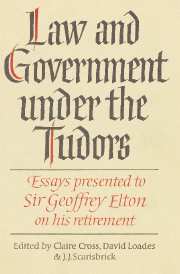Book contents
- Frontmatter
- Contents
- List of contributors
- Preface
- Abbreviations
- Wolsey and the Parliament of 1523
- The Act of Appeals and the English reformation
- Thomas Cromwell and the ‘brethren’
- Henry VIII and the dissolution of the Secular Colleges
- God's law and man's: Stephen Gardiner and the problem of loyalty
- Bondmen under the Tudors
- Wales and England after the Tudor ‘union’: Crown, principality and parliament, 1543–1624
- Robe and sword in the conquest of Ireland
- The principal secretaries in the reign of Edward VI: reflections on their office and archive
- Philip II and the government of England
- Sin and society: the northern high commission and the northern gentry in the reign of Elizabeth I
- The crown, the gentry and London: the enforcement of proclamation, 1596–1640
- Taxation and the political limits of the Tudor state
- Bibliography of the writings of G. R. Elton, 1946–1986
- Index
Bondmen under the Tudors
Published online by Cambridge University Press: 06 July 2010
- Frontmatter
- Contents
- List of contributors
- Preface
- Abbreviations
- Wolsey and the Parliament of 1523
- The Act of Appeals and the English reformation
- Thomas Cromwell and the ‘brethren’
- Henry VIII and the dissolution of the Secular Colleges
- God's law and man's: Stephen Gardiner and the problem of loyalty
- Bondmen under the Tudors
- Wales and England after the Tudor ‘union’: Crown, principality and parliament, 1543–1624
- Robe and sword in the conquest of Ireland
- The principal secretaries in the reign of Edward VI: reflections on their office and archive
- Philip II and the government of England
- Sin and society: the northern high commission and the northern gentry in the reign of Elizabeth I
- The crown, the gentry and London: the enforcement of proclamation, 1596–1640
- Taxation and the political limits of the Tudor state
- Bibliography of the writings of G. R. Elton, 1946–1986
- Index
Summary
Imitation being the sincerest form of flattery, this paper borrows its title directly from a study published eight decades ago by Alexander Savine, one of the great pioneers in the generation of F. W. Maitland who sought to use legal history to illuminate the social and economic history of England. Its purpose is to provide an interim report on our present knowledge of serfdom in the Tudor age. Savine made it clear that serfdom remained a reality into the sixteenth century; what can be done now is to paint this picture in even brighter colours. For serfdom was an institution surprisingly tenacious and widespread through the early Tudor age, and its eventual disappearance was the subject of legal and financial campaigns of thoroughness and ingenuity.
The survival of personal unfreedom has been largely concealed from us because after its practical demise at the end of Elizabeth's reign, it was in no one's interest to remember it outside antiquarian circles. Indeed, there were some surprisingly influential people who had a vested interest in forgetting the whole institution. The case of the mayor of Bristol who was harassed by Lord Stafford during 1586–7 about his supposed villein status is well known; the mayor was probably safe as citizen of a great city with a custom of conferring legal freedom on serfs after a year and a day's residence. However, there were some serfs in prominent places during Elizabeth's reign whose status cannot be in doubt; among the bondmen of the crown were a fellow of All Souls, Oxford, and a fellow of Peterhouse, Cambridge.
- Type
- Chapter
- Information
- Law and Government under the TudorsEssays Presented to Sir Geoffrey Elton, pp. 91 - 110Publisher: Cambridge University PressPrint publication year: 1988
- 8
- Cited by

